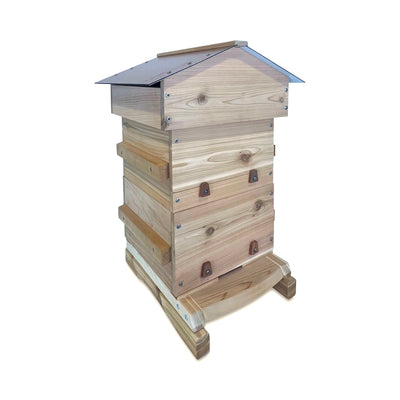What Sustainability Means to Us
The word sustainability is often used vaguely, and with so many murky definitions, it can be hard knowing what’s really intended. Here is what sustainability means to us here at Bee Thinking.
It’s paramount that in our work of crafting hives that we aren’t causing harm to forests while helping bees, and we know our customers feel the same way. We take concrete steps to source wood that is FSC certified and responsibly grown and harvested, and now we are the first hive producer to become FSC certified.
Our passion for bees is as immense as is our concern for the environment and nature. That’s why we source wood that won’t harm our forests. Here are just some of the ways that we aim to nurture the balance of our ecosystems, support the bounty of our beautiful land, and encourage beekeepers to join us in our mission to promote pollinator health. Since 2008, sustainability has been at the forefront of our minds. In fact, the first wood we ever sourced was salvaged western red cedar—trees that had fallen in storms or had been harvested due to disease. Even though we have outgrown that wood source, we haven’t outgrown our commitment to using local and sustainable materials.
Since 2008, sustainability has been at the forefront of our minds. In fact, the first wood we ever sourced was salvaged western red cedar—trees that had fallen in storms or had been harvested due to disease. Even though we have outgrown that wood source, we haven’t outgrown our commitment to using local and sustainable materials.
We believe that beekeepers care about the environment and are committed to doing their part to help. We think beekeeping suppliers should do the same.
After plenty of careful research, we decided to source our wood from forests certified by the Forest Stewardship Council. FSC is a highly respected, third party certification that currently sets the bar for defining sustainable forest management. FSC is an international organization that provides principles and audits with the strictest requirements to ensure lumber comes from forests that maintain natural integrity, protect indigenous rights, and support surrounding communities.
As a result, FSC wood often commands the highest market price because of its quality and because it is harvested with minimal impact to the environment and the surrounding communities. We believe that by supporting the demand for sound forestry practices in the construction of long-lasting bee hives and woodenware, we benefit honeybee health by producing a beehive that is truly sustainable and considers all of nature. Not only is our wood FSC certified, but it all comes from sustainably-managed forests in Oregon and Northern California, reducing the carbon footprint tied to transportation, and helping the local economy.

Here at Bee Thinking, we use two types of wood to make our beehives: sugar pine and western red cedar. Sugar pine grows in southern Oregon and northern California. They are the largest of the pine trees, and John Muir called it the "King of the Conifers" for that reason. Sugar pine trees grow very straight, are dimensionally stable (meaning they resist warping, shrinking), and process beautifully through our machines with minimal tearing or cracking, making it the ideal pine species for bee hives.
Western Red Cedar is the premier beehive material. Native to the Pacific Northwest, Western Red Cedar is rot resistant, stable, lightweight, has tight straight grain, and insulates better than pine. It is revered for its beautiful grain and coloration, and due to its decay resistance, doesn't require paint in the elements. Our cedar is harvested within a couple hours of our Portland location.
We work extremely hard to use every scrap and shaving left over as we create hives. We use these pieces to produce birdhouses, mason bee houses, wooden feeders, and extra cedar shavings for quilt boxes both on our website and in our retail shop. We are always working to develop the new products and accessories our customers ask for, in a way that utilizes every bit of the wood we’ve brought in and in keeping with the design aesthetics we are known for.

Our efforts don’t end with wood sourcing, but apply to all aspects of our business. Each year we ship thousands of hives to our customers all over the world. To mitigate the environmental impact of shipping, we invest in carbon neutral offsets through our shipping providers whenever possible.
We hope this helps to make clear what we mean when we say we are committed to sustainability in every aspect. If you want to hear even more about our sustainability philosophy, check out the below video with our co-founder, Matt!






Leave a comment